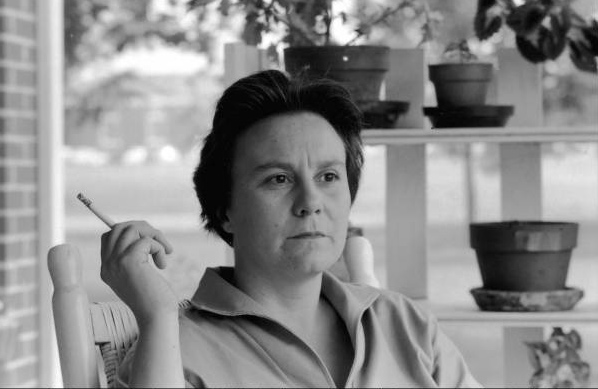
The inside story behind Harper Lee and TO KILL A MOCKINGBIRD still remains elusive in HEY. BOO (photo by Donald Uhrbrock)
HEY, BOO: HARPER LEE AND TO KILL A MOCKINGBIRD (Mary McDonagh Murphy, 2010)
Quad Cinema
34 West 13th St.
Opens Friday, May 13
212-255-2243
www.firstrunfeatures.com/heyboo
www.quadcinema.com
 On May 4, 1961, Harper Lee won the Pulitzer Prize for Fiction for what turned out to be her only novel and an enduring American classic, To Kill a Mockingbird. A captivating tale of racism in a small southern town based on her own, the book was made into a hit film the next year starring Gregory Peck as determined lawyer and single parent Atticus Finch, garnering eight Oscar nominations and three wins, including one for Peck for Best Actor. As famous as the book and film are, very little is known about Lee, who has not given an interview since 1964 and is rarely seen in public. In Hey, Boo: Harper Lee and To Kill a Mockingbird, documentarian Mary McDonagh Murphy sets out to uncover the story behind this mysterious figure. She speaks with Lee’s ninety-nine-year-old sister, Alice; actress Mary Badham, who played Scout in the movie; and Joy and Michael Brown, who helped Lee afford to quit her job as an airline reservation agent so she could concentrate on her book back in the late 1950s. Although they lend insight into Lee’s character and the creation of To Kill a Mockingbird, the rest of Hey, Boo consists primarily of a series of talking heads discussing what the book means to them, coming off more like a PBS special than a feature-length theatrical documentary. Murphy, who has indeed spent most of her career making television documentaries (for PBS, CNBC, and CBS), speaks with Oprah Winfrey, Tom Brokaw, Wally Lamb, Andrew Young, Rosanne Cash, Scott Turow, Richard Russo, James McBride, Anna Quindlen, Allan Gurganus, and other writers, historians, and public figures who discuss various aspects of the book, but it’s mostly filling the time the director — and the viewer — would have rather spent with Lee herself, who declined to participate. Murphy does play excerpts from the 1964 radio interview and reveals interesting tidbits about the editing process Lee and the novel went through, but there’s just not enough new information to sustain the film’s already-brief eighty-two minutes. You’re better off reading the novel again — or for the first time — if you really want to delve into its many wonders.
On May 4, 1961, Harper Lee won the Pulitzer Prize for Fiction for what turned out to be her only novel and an enduring American classic, To Kill a Mockingbird. A captivating tale of racism in a small southern town based on her own, the book was made into a hit film the next year starring Gregory Peck as determined lawyer and single parent Atticus Finch, garnering eight Oscar nominations and three wins, including one for Peck for Best Actor. As famous as the book and film are, very little is known about Lee, who has not given an interview since 1964 and is rarely seen in public. In Hey, Boo: Harper Lee and To Kill a Mockingbird, documentarian Mary McDonagh Murphy sets out to uncover the story behind this mysterious figure. She speaks with Lee’s ninety-nine-year-old sister, Alice; actress Mary Badham, who played Scout in the movie; and Joy and Michael Brown, who helped Lee afford to quit her job as an airline reservation agent so she could concentrate on her book back in the late 1950s. Although they lend insight into Lee’s character and the creation of To Kill a Mockingbird, the rest of Hey, Boo consists primarily of a series of talking heads discussing what the book means to them, coming off more like a PBS special than a feature-length theatrical documentary. Murphy, who has indeed spent most of her career making television documentaries (for PBS, CNBC, and CBS), speaks with Oprah Winfrey, Tom Brokaw, Wally Lamb, Andrew Young, Rosanne Cash, Scott Turow, Richard Russo, James McBride, Anna Quindlen, Allan Gurganus, and other writers, historians, and public figures who discuss various aspects of the book, but it’s mostly filling the time the director — and the viewer — would have rather spent with Lee herself, who declined to participate. Murphy does play excerpts from the 1964 radio interview and reveals interesting tidbits about the editing process Lee and the novel went through, but there’s just not enough new information to sustain the film’s already-brief eighty-two minutes. You’re better off reading the novel again — or for the first time — if you really want to delve into its many wonders.